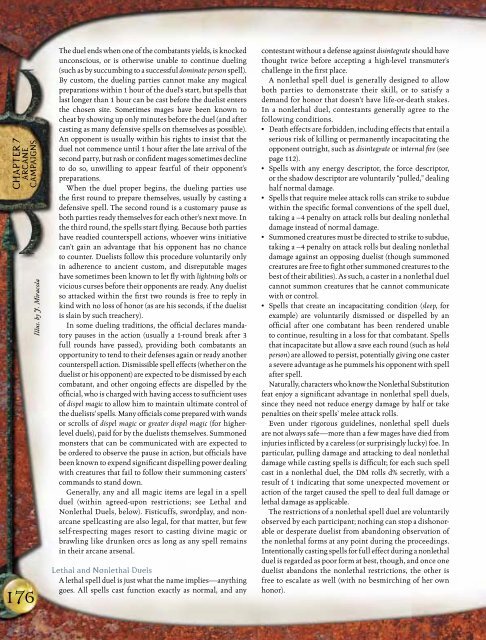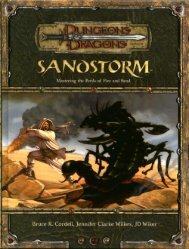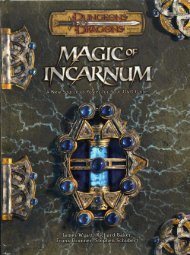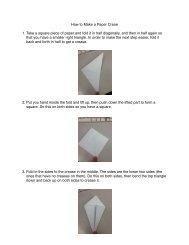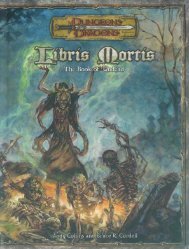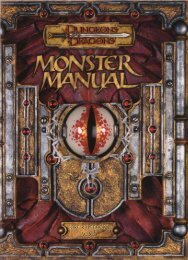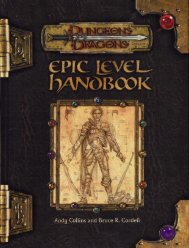Complete A..
Complete A..
Complete A..
- No tags were found...
Create successful ePaper yourself
Turn your PDF publications into a flip-book with our unique Google optimized e-Paper software.
CHAPTER 7ARCANECAMPAIGNS176Illus. by J. MiracolaThe duel ends when one of the combatants yields, is knockedunconscious, or is otherwise unable to continue dueling(such as by succumbing to a successful dominate person spell).By custom, the dueling parties cannot make any magicalpreparations within 1 hour of the duel’s start, but spells thatlast longer than 1 hour can be cast before the duelist entersthe chosen site. Sometimes mages have been known tocheat by showing up only minutes before the duel (and aftercasting as many defensive spells on themselves as possible).An opponent is usually within his rights to insist that theduel not commence until 1 hour after the late arrival of thesecond party, but rash or confident mages sometimes declineto do so, unwilling to appear fearful of their opponent’spreparations.When the duel proper begins, the dueling parties usethe first round to prepare themselves, usually by casting adefensive spell. The second round is a customary pause asboth parties ready themselves for each other’s next move. Inthe third round, the spells start flying. Because both partieshave readied counterspell actions, whoever wins initiativecan’t gain an advantage that his opponent has no chanceto counter. Duelists follow this procedure voluntarily onlyin adherence to ancient custom, and disreputable mageshave sometimes been known to let fly with lightning bolts orvicious curses before their opponents are ready. Any duelistso attacked within the first two rounds is free to reply inkind with no loss of honor (as are his seconds, if the duelistis slain by such treachery).In some dueling traditions, the official declares mandatorypauses in the action (usually a 1-round break after 3full rounds have passed), providing both combatants anopportunity to tend to their defenses again or ready anothercounterspell action. Dismissible spell effects (whether on theduelist or his opponent) are expected to be dismissed by eachcombatant, and other ongoing effects are dispelled by theofficial, who is charged with having access to sufficient usesof dispel magic to allow him to maintain ultimate control ofthe duelists’ spells. Many officials come prepared with wandsor scrolls of dispel magic or greater dispel magic (for higherlevelduels), paid for by the duelists themselves. Summonedmonsters that can be communicated with are expected tobe ordered to observe the pause in action, but officials havebeen known to expend significant dispelling power dealingwith creatures that fail to follow their summoning casters’commands to stand down.Generally, any and all magic items are legal in a spellduel (within agreed-upon restrictions; see Lethal andNonlethal Duels, below). Fisticuffs, swordplay, and nonarcanespellcasting are also legal, for that matter, but fewself-respecting mages resort to casting divine magic orbrawling like drunken orcs as long as any spell remainsin their arcane arsenal.Lethal and Nonlethal DuelsA lethal spell duel is just what the name implies—anythinggoes. All spells cast function exactly as normal, and anycontestant without a defense against disintegrate should havethought twice before accepting a high-level transmuter’schallenge in the first place.A nonlethal spell duel is generally designed to allowboth parties to demonstrate their skill, or to satisfy ademand for honor that doesn’t have life-or-death stakes.In a nonlethal duel, contestants generally agree to thefollowing conditions.• Death effects are forbidden, including effects that entail aserious risk of killing or permanently incapacitating theopponent outright, such as disintegrate or internal fire (seepage 112).• Spells with any energy descriptor, the force descriptor,or the shadow descriptor are voluntarily “pulled,” dealinghalf normal damage.• Spells that require melee attack rolls can strike to subduewithin the specific formal conventions of the spell duel,taking a –4 penalty on attack rolls but dealing nonlethaldamage instead of normal damage.• Summoned creatures must be directed to strike to subdue,taking a –4 penalty on attack rolls but dealing nonlethaldamage against an opposing duelist (though summonedcreatures are free to fight other summoned creatures to thebest of their abilities). As such, a caster in a nonlethal duelcannot summon creatures that he cannot communicatewith or control.• Spells that create an incapacitating condition (sleep, forexample) are voluntarily dismissed or dispelled by anofficial after one combatant has been rendered unableto continue, resulting in a loss for that combatant. Spellsthat incapacitate but allow a save each round (such as holdperson) are allowed to persist, potentially giving one castera severe advantage as he pummels his opponent with spellafter spell.Naturally, characters who know the Nonlethal Substitutionfeat enjoy a significant advantage in nonlethal spell duels,since they need not reduce energy damage by half or takepenalties on their spells’ melee attack rolls.Even under rigorous guidelines, nonlethal spell duelsare not always safe—more than a few mages have died frominjuries inflicted by a careless (or surprisingly lucky) foe. Inparticular, pulling damage and attacking to deal nonlethaldamage while casting spells is difficult; for each such spellcast in a nonlethal duel, the DM rolls d% secretly, with aresult of 1 indicating that some unexpected movement oraction of the target caused the spell to deal full damage orlethal damage as applicable.The restrictions of a nonlethal spell duel are voluntarilyobserved by each participant; nothing can stop a dishonorableor desperate duelist from abandoning observation ofthe nonlethal forms at any point during the proceedings.Intentionally casting spells for full effect during a nonlethalduel is regarded as poor form at best, though, and once oneduelist abandons the nonlethal restrictions, the other isfree to escalate as well (with no besmirching of her ownhonor).


